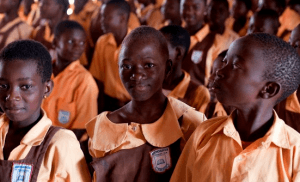Cancellation of PTA levies affecting school management – Circuit Supervisor
 Mr Libertine Kpangkpari, the Bamahu Circuit Supervisor has stated that the cancellation of the Parents Teacher Association (PTA) levies is making it difficult for school authorities to run their schools.
Mr Libertine Kpangkpari, the Bamahu Circuit Supervisor has stated that the cancellation of the Parents Teacher Association (PTA) levies is making it difficult for school authorities to run their schools.
He said the rain storms had already ripped off the roofs of a number of schools within the Circuit, and just two sheets of zinc to fix the problem in some schools is challenging for the PTA because of the lack of funds.
Mr Kpangkpari stated this at Bamahu in the Wa Municipality during the Upper West Regional Youth Parliament and Plan International Ghana advocacy engagements with responsible institutions and the youth on poor performance of public basic schools in the Upper West Region.
“You cannot run schools without funds”, he said.
The Circuit Supervisor said the Capitation Grant was erratic and even scanty for some of the Junior High Schools (JHSs) due to low enrolment figures, hence could not be used to address any serious challenges affecting quality education in the schools.
He mentioned over enrolment, lack of staff common rooms, and electricity in the JHSs, text books, ICT centres, proper parental care, poor community involvement and capacity building for teachers on the new syllabi as some of the challenges affecting performance in public schools.
Mr Kpangkpari disclosed that some computers that were given to schools in his circuit to aid in the teaching and learning of ICT had been lying idle for some time now due to the lack of electricity in the schools.
He said these and many other challenges if not addressed would continue to affect quality education in the public schools.
Mr James Baba Anabiga, the Speaker of the Upper West Regional Youth Parliament, noted that basic schools performance statistics indicated that private schools were performing better than the public schools.
He pointed out that about 90 per cent of public school teachers have their wards in private schools when indeed the public schools have more professional teachers than the private schools.
According to Mr Anabiga, these were some of the issues the Regional Youth Parliament and Plan Ghana International were seeking to address through the introduction of the advocacy project.
A number of recommendations were made at the end of the programme to help address the poor education performance in public basic schools.
Among these are that government should review its position on the payment of PTA dues; central government past pupils, Members of Parliament, Non-Governmental Organisations, and religious institutions should all support to reduce the infrastructure deficit in public basic schools.
Parents should make time to monitor their children at home whilst guidance and counseling units should be introduced at the basic school level to counsel the girls to reduce teenage pregnancies and improve on their academic performance.
The rest are enhancement of effective supervision across schools to ensure quality education and parents should also change their attitude and take care of their children in public schools just like how they take care of those in the private school for an improved academic performance.
Source: GNA
